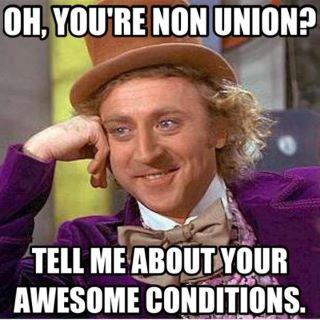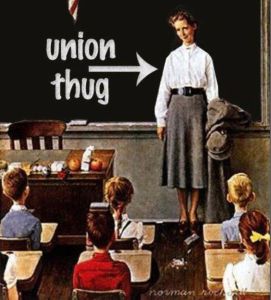When it comes to the First Amendment, the Supreme Court ruled against unions in Janus v. AFSCME 2018 because forcing public employees and non-union employees to pay union dues is a violation of free speech.

Here’s the simple facts in this case. Mark Janus, a public employee, was the petitioner. Also, the American Federation of State, County, and Municipal Employees, Council 31 was the respondent. These are the players in Janus v. AFSCME.
Originally, Janus had it’s beginnings with a decision in a labor case called Abood v. Detroit Board of Education 1977. In this case, Michigan had a law which held that employers could charge employees union fees. Anyways, the Abood held that public employees must pay their unions agency/shop fees because they benefit from collective barging. Abood was the leading case on labor union fees until 2018.
Now, in Janus v. AFSCME 2018, Illnois had a similar law to the Michigan law. Here, an Illnois governor brought suit, but the courts dismissed his case because he lacked standing. However, public employees did have standing, and they claimed their right to free speech was violated because they were compelled to pay union fees.
When it came the Janus case, the Supreme Court ruled this way. The Court said the First Amendment’s free speech clause is violated when Illnois made public sector employees pay union fees. Also, the Court overruled Abood v. Detroit Board of Education.
As for the majority opinion Janus. Supreme Court Justice Alito said agency shop agreements violate “the free speech rights of nonmembers by compelling them to subsidize private speech on matters of substantial public concern.”
In fact, in giving his majority opinion, Justice Alito quoted the famous Supreme Court Justice Robert. H Jackson (BTW had a racial restricted covenant on his home) who presided over the Nuremberg trails during World War 2.
“If there is any fixed star in our constitutional constellation, it is that no official, high or petty, can prescribe what shall be orthodox in politics, nationalism, religion, or other matters of opinion or force citizens to confess by word or act their faith therein.”
According to the majority in the Janus case, when an employee pays a union due, that is a direct violation of the First Amendment right to free speech. Justice Alito states: “Neither an agency fee nor any other payment to the union may be deducted from a nonmember’s wages, nor may any other attempt be made to collect such a payment, unless the employee affirmatively consents to pay. By agreeing to pay, nonmembers are waiving their First Amendment rights, and such a waiver cannot be presumed. … Abood was wrongly decided and is now overruled.”
In regards to the dissent opinion. Justice Elena Kagan criticized the majority opinion saying their decision “overthrows a decision Abood entrenched in this nation’s law — and in its economic life — for over 40 years.”
Justice Elena Kagan was mad at the Janus decision. In her dissent, Justice Elena Kagan called some of her colleagues on the bench ” black-robed rulers overriding citizens’ choices.”
Furthermore, Justice Elena Kagan felt the conservatives were weaponizing the First Amendment in this decision. “And it does so by weaponizing the First Amendment, in a way that unleashes judges, now and in the future, to intervene in economic and regulatory policy.”
Indeed, Justice Elena Kagan sees the future of employer/employee relations becoming uncertain as a result of this decision. “The majority undoes bargains reached all over the country. … It does so with no real clue of what will happen next—of how its action will alter public-sector labor relations. It does so even though the government services affected—policing, firefighting, teaching, transportation, sanitation (and more)—affect the quality of life of tens of millions of Americans.”
Supreme Court Justice Elena Kagan, a possible future Supreme Court Chief Justice and moderate on the Court, sees this decision as plunging workplace relations into chaos.
“The majority undoes bargains reached all over the country. … It does so with no real clue of what will happen next—of how its action will alter public-sector labor relations. It does so even though the government services affected—policing, firefighting, teaching, transportation, sanitation (and more)—affect the quality of life of tens of millions of Americans.”
Some say Janus was decided on politics. In the past, the votes were there to keep Abood intact with all Justices in agreement. However, the Supreme Court shifted with the addition of two new conservative appointed justices and the vote turned 5 – 4 against Abood.
After Janus, it was feared that the unions would disappear. However, the Janus decision did not effect unions. Unions continued to make agreements with with private and public sectors, even though some states were right to work states. Unions did not disappear when agency/dues were ruled against in Janus.
In conclusion, Janus was a First Amendment case, which some say was decided upon ideological and philosophical lines. That being said, a conservative majority said public employees and non-union employees do not have to pay union dues since that is a violation of their right to free speech. However, the liberal wing of the Supreme Court saw the conservatives as weaponizing free speech with this decision to get exemptions from statutes, while returning to the Lochner era. Indeed, the Supreme Court went with a different theory of the Constitution with the Janus decision, which was a sudden departure from the theory of Constitution behind Abood v. Detroit Board of Education (1977) in the past.
